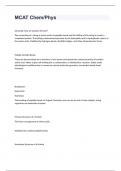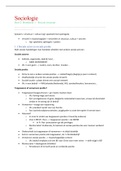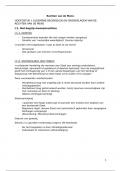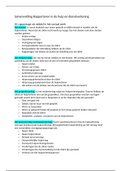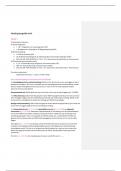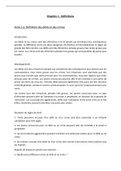PROBLEM 6:
KARL POPPER
Background:
- one of the greatest philosophers of science à social and political philosopher
- Took falsifiability as his criterion for demarcating science from non-science
- believed that scientific knowledge is provisional – the best we can do at the moment.
attempted to refute the classical positivist account of the scientific method à replacing induction
with the falsification principle.
Popper: Conjectures And Refutations
Popper’s Falsificationism
- Traditional account of knowledge was the platonic conception that it is justified, true, belief
- He claims that truth, justification and belief are not the distinguishing characteristics of
knowledge
Knowledge is not Justified
- We can never justify propositions or theories for several reasons
o We can never subject our theories to all possible tests, it is always possible that one of
the unconducted tests might falsify our theory
§ All tests that will be conducted will be a very small faction of all possible tests
o Does not lead to skepticism because he maintains that we can rationally criticize our
theories and hold those that have best survived our criticism
o Confirmation not the best method for arriving at truths
o Criticism is the best method of error elimination
o Knowledge grows only through correction of our mistakes à by falsifying our beliefs
and theories
Knowledge is not true
- Not something that is certainly true
- It is verisimilitude (truth-likeness) because it has survived our attempts to refute it
- Survival of our beliefs to these attempts at falsification allows us to say that these “look like
the truth” but are not absolutely true
Knowledge is not belief
- Knowledge not a matter of subjective belief but is objective in 2 ways
, o Claims when evaluation, become objects
o Problems, theories and arguments exist independently of whether anyone believes,
asserts or acts on these
Took biology as the most informative science for philosophy of science
- Evolutionary theory: exist as evolved organisms facing problems of reproductions in real
environment
§ we know that the environment tolerates our perceptions, theories and
movements because we are surviving
§ false theories/perceptions/movements can get us killed
How did Popper arrive at these conclusions?
- interested in the demarcation questions (when should a theory be characterized as
scientific?)
Science: relied on inductive, empirical method
o only if it rules out some observable states of affairs
o only legitimate to test only if it is an attempt to falsify that theory by seeing if states of
affairs can occur or not
General relativity (GR): Einstein’s theory of special relativity
- was risky (possible to deduce consequences from which in the light of the then dominant
Newtonian physics were improbable) and if they were false could falsify the whole theory.
- inconsistent with certain possible results of observation
- Is scientific
- makes bold, counter intuitive claims about nature of reality
- Can account for previously observed phenomena
Pseudoscience:
- Psychoanalysis: human behaviour is driven at least in part by unconscious desires and
motives.
- Freud posited the existence of the id, an unconscious part of the human psyche that aims
toward gratifying instinctive desires, regardless of whether this is rational.
- Not scientific à do not allow them to be falsified
§ Compatible with every possible human behaviour
- makes bold, counter intuitive claims about nature of reality
- Can account for previously observed phenomena
Good theory should divide the set of all statements derivable from it into 2 subsets
KARL POPPER
Background:
- one of the greatest philosophers of science à social and political philosopher
- Took falsifiability as his criterion for demarcating science from non-science
- believed that scientific knowledge is provisional – the best we can do at the moment.
attempted to refute the classical positivist account of the scientific method à replacing induction
with the falsification principle.
Popper: Conjectures And Refutations
Popper’s Falsificationism
- Traditional account of knowledge was the platonic conception that it is justified, true, belief
- He claims that truth, justification and belief are not the distinguishing characteristics of
knowledge
Knowledge is not Justified
- We can never justify propositions or theories for several reasons
o We can never subject our theories to all possible tests, it is always possible that one of
the unconducted tests might falsify our theory
§ All tests that will be conducted will be a very small faction of all possible tests
o Does not lead to skepticism because he maintains that we can rationally criticize our
theories and hold those that have best survived our criticism
o Confirmation not the best method for arriving at truths
o Criticism is the best method of error elimination
o Knowledge grows only through correction of our mistakes à by falsifying our beliefs
and theories
Knowledge is not true
- Not something that is certainly true
- It is verisimilitude (truth-likeness) because it has survived our attempts to refute it
- Survival of our beliefs to these attempts at falsification allows us to say that these “look like
the truth” but are not absolutely true
Knowledge is not belief
- Knowledge not a matter of subjective belief but is objective in 2 ways
, o Claims when evaluation, become objects
o Problems, theories and arguments exist independently of whether anyone believes,
asserts or acts on these
Took biology as the most informative science for philosophy of science
- Evolutionary theory: exist as evolved organisms facing problems of reproductions in real
environment
§ we know that the environment tolerates our perceptions, theories and
movements because we are surviving
§ false theories/perceptions/movements can get us killed
How did Popper arrive at these conclusions?
- interested in the demarcation questions (when should a theory be characterized as
scientific?)
Science: relied on inductive, empirical method
o only if it rules out some observable states of affairs
o only legitimate to test only if it is an attempt to falsify that theory by seeing if states of
affairs can occur or not
General relativity (GR): Einstein’s theory of special relativity
- was risky (possible to deduce consequences from which in the light of the then dominant
Newtonian physics were improbable) and if they were false could falsify the whole theory.
- inconsistent with certain possible results of observation
- Is scientific
- makes bold, counter intuitive claims about nature of reality
- Can account for previously observed phenomena
Pseudoscience:
- Psychoanalysis: human behaviour is driven at least in part by unconscious desires and
motives.
- Freud posited the existence of the id, an unconscious part of the human psyche that aims
toward gratifying instinctive desires, regardless of whether this is rational.
- Not scientific à do not allow them to be falsified
§ Compatible with every possible human behaviour
- makes bold, counter intuitive claims about nature of reality
- Can account for previously observed phenomena
Good theory should divide the set of all statements derivable from it into 2 subsets

